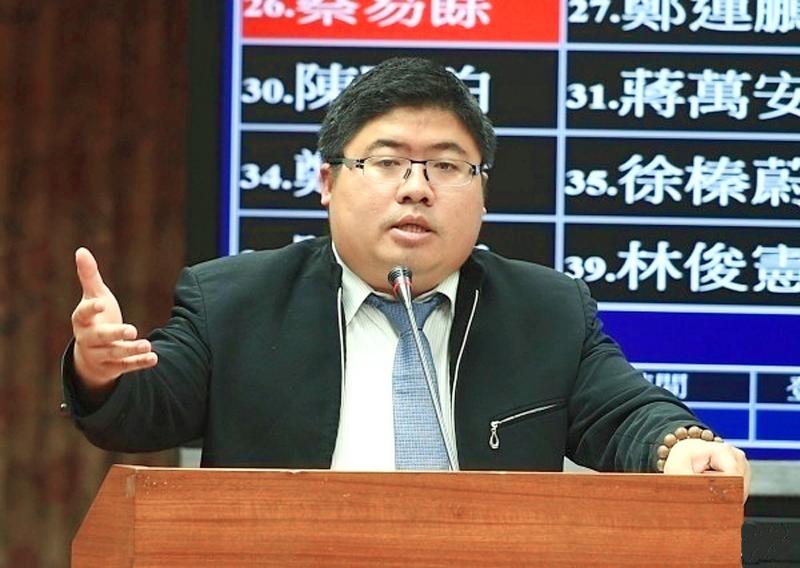Democratic Progressive Party (DPP) Legislator Tsai Yi-yu (蔡易餘) yesterday retracted a proposal to remove “unification of the nation” from the Act Governing Relations Between the People of the Taiwan Area and the Mainland Area (台灣地區與大陸地區人民關係條例), citing concern over the proposal throwing cross-strait ties off balance ahead of President Tsai Ing-wen’s (蔡英文) re-inauguration on Wednesday next week.
He also withdrew a similar proposal to amend the preface to the Additional Articles of the Constitution by taking out “to meet the needs before the unification of the nation.”
The proposed amendment to the act had advanced to committee review, while the proposals to amend the additional articles of the Constitution could have passed a first reading yesterday, Tsai Yi-yu said.
Given that the world has likely seen through the nature of the Chinese Communist Party amid the COVID-19 pandemic, he thought it was the right time to help the nation break free from the framework of unification imposed by the additional articles of the Constitution, promulgated in 1991, he said.
However, with Tsai Ing-wen’s inauguration approaching, he did not want the proposals to be a source of contention for China and opposition parties, which would give Beijing a pretext for saber rattling and undermining peace, he said.
Following discussions with DPP caucus whip Ker Chien-ming (柯建銘), Tsai Yi-yu, despite acknowledging a recent swell of anti-China sentiment, said he decided not to run the risk.
He is aware that retracting the proposals would invite ridicule, but he had to do so for the nation’s future, he said, adding that he believes that the president would lead the nation along the right path.
Tamkang University Graduate Institute of China Studies associate professor Chang Wu-ueh (張五岳) said that Tsai Yi-yu likely had to retract the proposals because Tsai Ing-wen said in her inauguration speech four years ago that she would abide by the act, the Constitution and other applicable laws when handling cross-strait relations, which are fragile due to a lack of mutual trust between Taipei and Beijing.
Although the act is on a lower level than the Constitution, it defines the fundamentals of cross-strait relations, so Tsai Yi-yu’s proposal to change the act — which would change those fundamentals — would likely trigger China, Chang said.
The retraction of the bills is a gesture of basic goodwill, which shows the nation’s stance on cross-strait ties has remained consistent and that it would not resort to “double-dealing” over the issue, he said.
Separately yesterday, Chinese Nationalist Party (KMT) Chairman Johnny Chiang (江啟臣) called on the DPP to stop exploiting cross-strait issues.
The DPP had submitted a slew of similar proposals in the past, which all petered out as DPP lawmakers were not serious about pushing them forward, Chiang said.
The DPP should give a clear explanation about why it has retracted the proposals, he said.
Additional reporting by Shih Hsiao-kuang
Source: Taipei Times - 2020/05/16





















